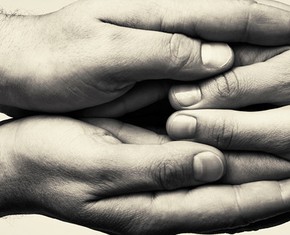The views expressed in our content reflect individual perspectives and do not represent the authoritative views of the Baha'i Faith.
Human beings sure have figured out a whole boatload of ways to divide and separate themselves from one another.
You’re Armenian, I’m Kenyan. You’re rich, I’m poor. You’re upper class, I’m lower class. You’re black, I’m white. You’re Jewish, I’m Christian. I’m a man, you’re a woman. You’re old, I’m young. You’re urban, I’m rural. You’re cool, I’m not. You’re a racist, I’m woke. You’re gay, I’m straight. You’re a conservative, I’m a liberal. You’re a citizen, I’m undocumented. You’re this, I’m that.
We could go on (and on and on), but you get the idea. People really like labels.
 It seems to be an perennial human obsession, this figuring out the details that differentiate us from others. Like scientists trying to classify various life forms into smaller and smaller taxonomies, we endlessly endeavor to put ourselves and others into rigid categories—then somehow manage to adopt those categories as our own personal reality.
It seems to be an perennial human obsession, this figuring out the details that differentiate us from others. Like scientists trying to classify various life forms into smaller and smaller taxonomies, we endlessly endeavor to put ourselves and others into rigid categories—then somehow manage to adopt those categories as our own personal reality.
But these categories, of course, separate us from one another. Worse, they create “identities”—those supposedly modern classifications of class, race, culture, sexuality, religion and nationality that we use to define ourselves and others. What’s wrong with that, you might ask? Well, all across human history, the supposed differences between human beings have divided us, estranged us, and set us against each other. Once I label you as different than me, you become the “other”—a foreigner, an apostate, a stranger, unclean, different, someone completely divorced and separate from my human reality.
Recognizing That Humans Are All Related
As an example, I’m an older American white middle-class male—and a Baha’i. Therein lies the conundrum. I’ll try to explain: my Faith calls on me, not to emphasize the differences between myself and others, but to recognize every other human being on the face of the Earth as part of my family—really, as a part of me:
The divine religions must be the cause of oneness among men, and the means of unity and love; they must promulgate universal peace, free man from every prejudice, bestow joy and gladness, exercise kindness to all men and do away with every difference and distinction. Just as Baha’u’llah addressing the world of humanity saith: ’O people! Ye are the fruits of one tree and the leaves of one branch.’ – Abdu’l-Baha, Selections from the Writings of Abdu’l-Baha, p. 28.
If all of us are the fruits of one tree and the leaves of one branch, we are all one.
Baha’is believe that oneness represents our deepest and most profound reality. That oneness is our only true identity—despite every difference, we are all human beings. Genetically, every human being comes from one family tree. Humanity, the Baha’i teachings say, is not composed of two different trees:
Baha’u’llah has given full teachings to the world which are conducive to fellowship and unity in religion. Throughout past centuries each system of religious belief has boasted of its own superiority and excellence, abasing and scorning the validity of all others. Each has proclaimed its own belief as the light and all others as darkness. Religionists have considered the world of humanity as two trees: one divine and merciful, the other satanic; they themselves the branches, leaves and fruit of the divine tree and all others who differ from them in belief the product of the tree which is satanic. Therefore, sedition and warfare, bloodshed and strife have been continuous among them. The greatest cause of human alienation has been religion because each party has considered the belief of the other as anathema and deprived of the mercy of God.
The teachings specialized in Baha’u’llah are addressed to humanity. He says, “Ye are all the leaves of one tree.” He does not say, “Ye are the leaves of two trees: one divine, the other satanic.” He has declared that each individual member of the human family is a leaf or branch upon the Adamic tree; that all are sheltered beneath the protecting mercy and providence of God; that all are the children of God, fruit upon the one tree of His love. God is equally compassionate and kind to all the leaves, branches and fruit of this tree. Therefore, there is no satanic tree whatever—Satan being a product of human minds and of instinctive human tendencies toward error. God alone is Creator, and all are creatures of His might. Therefore, we must love mankind as His creatures, realizing that all are growing upon the tree of His mercy, servants of His omnipotent will and manifestations of His good pleasure. – Abdu’l-Baha, The Promulgation of Universal Peace, p. 230.
But in today’s world, many people have gone in the opposite direction by continuing to insist on splitting ourselves into smaller and smaller groups. The Baha’i teachings say that tendency needs to end:
The whole world must be looked upon as one single country, all the nations as one nation, all men as belonging to one race. Religions, races, and nations are all divisions of man’s making only, and are necessary only in his thought; before God there are neither Persians, Arabs, French nor English; God is God for all, and to Him all creation is one. We must obey God, and strive to follow Him by leaving all our prejudices and bringing about peace on earth. – Abdu’l-Baha, Paris Talks, p. 131.
We can only bring about peace on Earth, as Abdu’l-Baha said, through unity. We will never achieve that unity if we continue to split humanity up into smaller and more exclusive identities.
Join us in this series of essays as we explore the ways the Baha’i teachings recommend overcoming and transcending all of the artificially-created boundaries between people.
You May Also Like
Comments

















"...with firm resolve and clear vision, to establish the Cause of Universal Peace... They must conclude a binding treaty and establish a covenant, the provisions of which shall be sound, inviolable and definite. This supreme and noble undertaking—the real source of the peace and well-being of all the world—should be regarded as sacred... All the forces of humanity must be mobilized to ensure the stability and permanence of this Most Great Covenant. ...In this all-embracing Pact the limits and frontiers of each and every nation should be clearly fixed..."